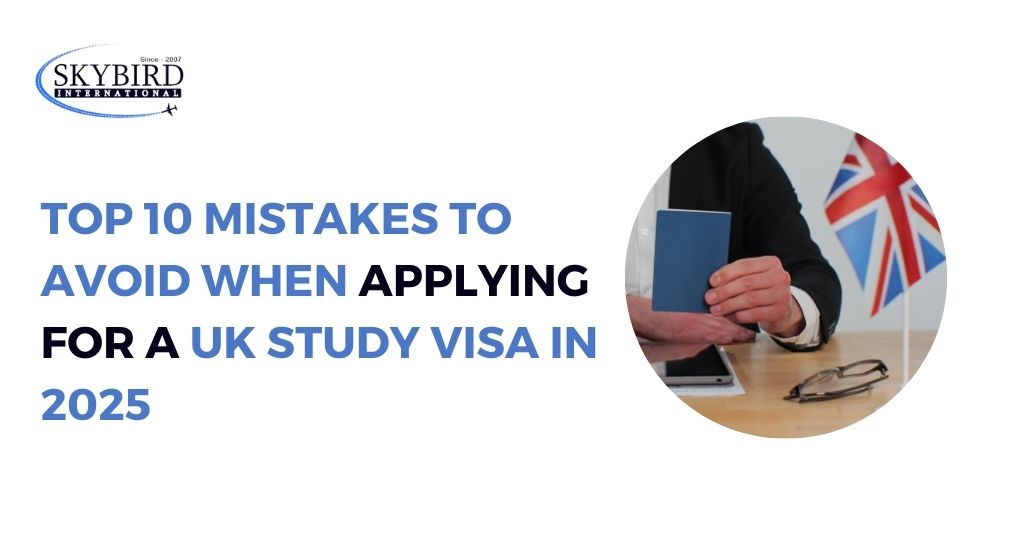Are you planning to move to the UK for your higher studies? It’s a great idea! Pursuing higher degrees in UK universities is a big step towards achieving your academic dreams. The country is known for its exceptional educational institutes, excellent career opportunities, and high living standards.
However, while the excitement builds, the visa application process can seem like a tricky puzzle. A small error or oversight can lead to unnecessary stress, delays, or worse rejection. To avoid these errors, professional visa consultants at ‘Skybird International guide you through the process.
This post will highlight the most common mistakes aspirants make when applying for a UK study visa in 2025. We’ll also discuss how to avoid these pitfalls to get a UK student visa as soon as possible.
Things to Avoid While Applying for a UK Student Visa
When applying for a visa, there is a chance you might make mistakes, especially if you try to do it yourself. However, do not bother; our expert visa consultants will assist you to avoid such mistakes and make your visa application perfect.
1. Incomplete or Incorrect Documentation
Your documents are the foundation of your visa application. Missing or incorrect information can create serious delays.
- Why accurate documentation matters: You need to prove your eligibility with specific documents or legal papers. Errors like misspelled names or mismatched dates raise concerns. UK Visa and Immigration (UKVI) will not accept incomplete files.
- Common documentation mistakes to avoid: You may encounter the following errors during the documentation process:
- Missing pages in financial documents.
- Submitting expired or near-expired passports.
- Incorrect translations of non-English documents.
- Inconsistent details, like mismatched names across documents.
- Incomplete travel history or previous visa refusals.
- What you should do: Double-check every document. Ensure all required pages are included, and all details are accurate and consistent.
2. Insufficient Financial Proof
Many students get rejected because they fail to show enough funds. UKVI has strict financial requirements for all applicants.
- What you need to show: You must prove you can cover tuition fees and living costs. The required amount depends on your course location. London usually requires higher living expenses compared to other regions.
- Common financial mistakes include:
- Not maintaining the required funds for the required time.
- Using funds from unapproved sources, such as a friend’s account.
- Failing to convert bank statements into GBP (Great British Pound) for clarity.
- Submitting old bank statements instead of recent ones.
- Tips to avoid these mistakes:
- Keep a stable account balance without withdrawing large amounts.
- Use bank statements from recognized financial institutions.
- Include currency conversion details on the day of submission.
Lastly, add a reminder to keep financial documentation ready in advance, as this often causes delays.
3. Ignoring CAS Details
The Confirmation of Acceptance for Studies (CAS) is a key document. It confirms your course details & university sponsorship.
- Why CAS is important: Your CAS number links your visa application to your course. Any mistakes in CAS details can cause rejections.
- Common CAS mistakes include:
- Discrepancies in names or course dates.
- Incorrect sponsorship details.
- Overlooking updates from the university.
- How to resolve these mistakes: Before applying, verify all details on your CAS, and check course duration, tuition fees, and any payments already made. If you notice an error, contact your university immediately for corrections.
4. Providing Incorrect English Language Proof
Proving English proficiency is a major visa requirement. Mistakes with test scores or invalid tests can lead to rejection.
- Requirements for English tests: You must take a test approved by UKVI, such as IELTS, TOEFL, or PTE. The score requirement depends on your university & course.
- Common mistakes to avoid:
- Taking an unapproved test.
- Submitting the wrong test type, like IELTS General instead of Academic.
- Failing to meet the minimum score required.
- How to avoid these issues: Verify that your chosen test is on the UKVI-approved list. Confirm the test type and score requirement with your university before applying.
5. Failing to Disclose Previous Visa Rejections
Honesty is essential when applying for a UK study visa. Hiding past visa rejections or criminal records can cause problems.
- Why full disclosure matters: UKVI conducts strict background checks. Failing to mention a previous refusal may be seen as dishonesty.
- Common mistakes include:
- Hiding information about past visa refusals.
- Lying about criminal records (if any in the past).
- What to do instead: Be transparent about your history. If you had a past rejection, explain the reason and include updated supporting documents. For example, if financial proof caused the refusal, provide new statements that show stability.
6. Choosing the Wrong Visa Type
Applying for the wrong visa type can create unnecessary complications.
- Types of student visas include:
- Student Visa: For courses longer than six months.
- Short-Term Study Visa: For courses shorter than six months.
- Child Student Visa: For students under 18.
- Why this matters: Selecting the wrong visa can limit your options. For example, a short-term study visa does not permit part-time work.
- What you should do: Confirm the correct visa type with your university. Check all requirements on the UKVI website to ensure you apply under the correct category.
7. Missing or Mismanaging Your Biometric Appointment
Completing your biometric documentation is a crucial step in the visa application process. Missing your appointment or failing to carry the correct documents can lead to delays or even rejection.
- Documents Required for Biometric Submission: To ensure a smooth process, you must bring the following necessary documents to the biometric center:
- Passport: A valid passport or travel document is mandatory.
- Biometric Appointment Letter: This confirms your scheduled appointment.
- Visa Application Confirmation: Carry a printed copy of your visa application submission with you.
- Supporting Documents: Any additional documents specified by the visa office, such as proof of payment or identity verification.
- Common mistakes to avoid:
- Missing the Appointment: Not attending your biometric appointment or arriving late can delay your visa application process.
- Forgetting Necessary Documents: Forgetting required documents may lead to rescheduling or complications.
- How to Avoid These Issues
- Review the confirmation letter carefully to know the time, date, and location of your appointment.
- Double-check the list of required documents provided by the visa center.
- Organize all your documents in advance and recheck them before your appointment.
8. Ignoring Deadlines and Timelines
Timing is vital for the visa process. Missing important deadlines can impact your admission.
- Why deadlines matter: UKVI and universities have strict timelines. Late submissions can delay your visa and affect your course start date.
- Consequences of missing deadlines:
- Delays in visa processing.
- Risk of deferring your admission to the next intake.
- Increased stress with last-minute travel arrangements.
- Tips to avoid missing deadlines:
- Map out all important dates, including application openings & deadlines.
- Start early to leave room for corrections or delays.
9. Not Preparing for the Credibility Interview
The credibility interview helps UKVI assess your intent to study in the UK. Being unprepared can reduce your chances of getting a visa.
- Purpose of the interview: The interviewer will ask about your course, university & future plans. Your answers need to show that you are a genuine student.
- Common mistakes during interviews:
- Nervousness, which can lead to unclear responses.
- Giving inconsistent answers about your course or career goals.
- How to prepare:
- Practice answering common questions about your study plans.
- Be confident and honest in your responses.
- Understand your course details and be prepared to explain why you chose to study in the UK.
10. Ignoring Visa Conditions & Compliance
Getting a visa is just the first step. You must follow all visa rules during your stay in the UK.
- Key visa conditions include:
- Working only the allowed number of hours per week.
- Attending classes regularly.
- Registering your address with local authorities if required.
- What happens if you breach conditions?
- Visa cancellation.
- Deportation from the UK.
- Bans on future visa applications.
- How to stay compliant: Learn the visa conditions when you receive it. Follow all rules regarding work hours, attendance, and reporting changes like a new address. Stay updated on UKVI regulations to avoid mistakes.
Overall, while applying for a UK student visa on your own, mistakes can happen. However, by keeping the common mistakes mentioned above in mind, you can greatly reduce the chances of errors. Seeking guidance from Skybird International experts can simplify the process and reduce stress.


